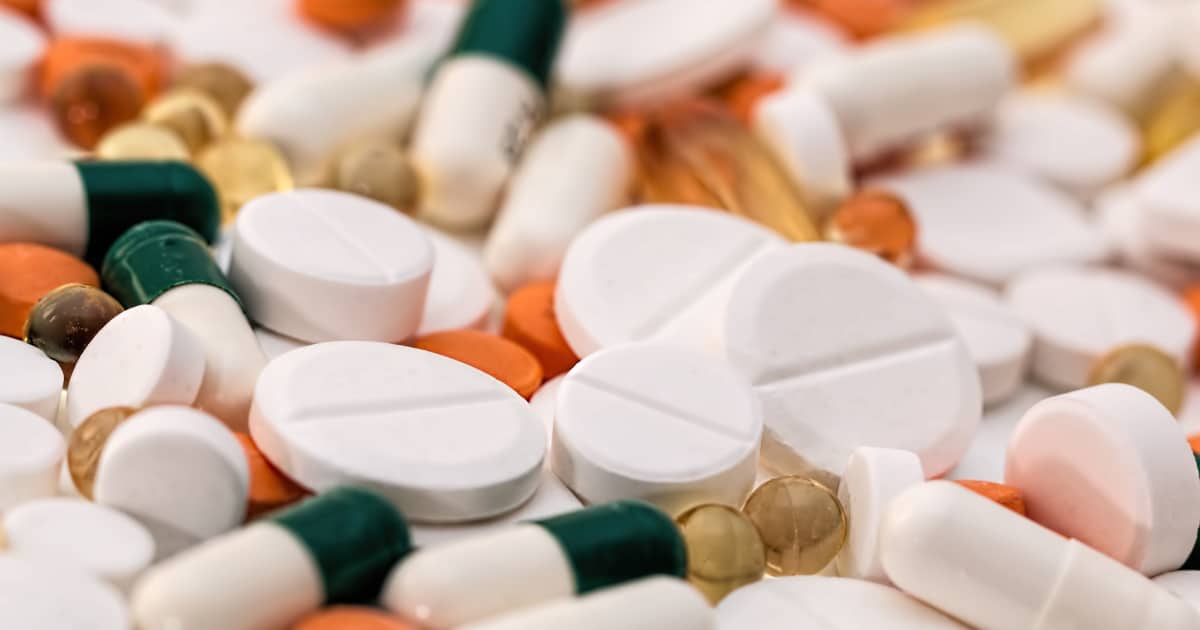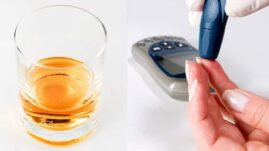According to a 2018 study by diaTribe, over 42 factors affect one’s blood sugar, ranging not only from biological factors such as too little sleep and stress to environmental factors such as sunburn, and even medications like prescription drugs and supplements.
Managing life with diabetes while also taking other prescribed medications or even a daily assortment of vitamins can become stressful.
In this article, I’ll list which drugs and supplements affect blood sugar the most. I’ll also discuss why they raise or lower your blood sugar, and what you can do to better manage the impact.
Always talk with your doctor before starting or stopping a new medication.

Table of Contents
Which prescription drugs affect blood sugar the most?
The following medications will impact your blood sugar the most tellingly:
Corticosteroids, or steroids for short, are notorious for causing high blood sugar in people with diabetes. Common steroids such as prednisone, betamethasone, or hydrocortisone make one’s liver resistant to insulin, causing significant insulin resistance in people with diabetes while they’re taking the medication.
Hormonal birth control containing progesterone will increase a woman’s insulin resistance, which happens naturally as a way for the body to prepare for pregnancy. Women with diabetes who use birth control containing progesterone may have elevated blood sugar during part of the entirety of their cycle.
Blood pressure medications (both beta-blockers and diuretics) flush sodium and potassium from the body. Potassium plays a pivotal role in absorbing glucose into fat and muscle tissue, so without proper potassium levels, blood sugars may rise.
Statins reduce insulin secretion in people with type 2 diabetes and will cause overall insulin resistance in people with type 1 diabetes as well, both of which will raise your blood sugar.
Dopamine and Epinephrine, both secreted naturally by the adrenal glands in response to stress, also cause blood sugar spikes due to preparing the body for “fight or flight” events.
Adrenaline used to treat severe allergic reactions naturally raises blood sugars.
Over-the-counter cough syrups cause blood sugars to rise because they usually contain sugar! Make sure to opt for sugar-free cough syrups whenever you can.
Common antibiotics, especially those in the fluoroquinolone class elevate blood sugars by causing insulin resistance. They can also cause large swings in blood sugar that can leave a person in a hypoglycemic state.
Anxiety and depression medications such as Ativan and Valium have been shown to increase both insulin resistance and blood sugar levels. Always check with your doctor before adjusting your dose on these types of medications.
Certain acne medications such as Accutane has been shown to increase blood sugar levels in both people with and without diabetes by increasing insulin resistance.
Common cold medications containing pseudoephedrine cause a spike in blood sugars by stimulating a glycogen release from the liver and reducing the uptake of glucose into cells. Many cold medications also contain sugar, so be sure to check the label.
Aspirin, taken in large doses, has been shown to lower blood sugar levels in patients.
Quinine, taken to treat Malaria, stimulates insulin release from the pancreas, causing low blood sugar.
Which supplements affect your blood sugar the most?
Caffeine, ingested as a liquid, or taken in pill form found in many energy and weight loss supplements, can cause blood sugars to spike. Caffeine causes insulin resistance in some people and can negatively affect postprandial blood sugar levels. Caffeine is also an appetite suppressant, so the effects are sometimes balanced out, but it is definitely still something to look out for.
Ginkgo Biloba increases the breakdown of insulin in your liver, leading to a need for more insulin and also higher blood sugars.
Melatonin doesn’t only help you sleep, but it also increases both insulin resistance and blood pressure, leading to higher blood sugars.
Vitamin B3 or Niacin, taken to reduce bad cholesterol, increases insulin resistance and raises blood sugar levels.
DHEA is a naturally-occurring hormone taken to treat many conditions, most notably, Lupus. This hormone increases insulin resistance in the body and causes higher blood sugars.
Why do certain drugs and supplements affect blood sugar?
It’s important to remember that these drugs and supplements are not targeting blood sugars, but are working to treat other ailments or deficiencies in the body, and blood sugars are sometimes the inevitable victim.
Blood sugar levels are extremely precarious, and taking a prescription drug that acts as a stimulant, for instance, can have significant effects on your blood sugar, but it doesn’t necessarily mean that the drug is “bad” for you, per se.
As a person living with diabetes, you will inevitably need to take other prescription drugs throughout your life, and the goal is not to avoid other medications altogether because of their impact on blood sugars, but rather to manage the effects they may have.
Many of these drugs and supplements are either hormones (DHEA, Adrenaline, Epinephrine, Dopamine, Progesterone) that raise blood sugars naturally to prepare the body for “fight or flight” situations or work to inhibit liver functioning that produces higher blood sugars.
Certain stimulants, such as caffeine and Niacin, cause insulin resistance, which will raise one’s blood sugars naturally.
Still more medications, such as common cold and cough suppressants, contain sugar that raises blood sugars when not carefully calibrated for.
On the other hand, aspirin has been shown to decrease diabetes-related inflammation, and thus actually decrease blood sugars.
How do I decide which medications are worth taking?
Just because some drugs and supplements may negatively affect blood sugars does not mean you should not take them! This will just require a little more planning on your part.
Always work with your doctor and medical team to determine what drugs and supplements to take, how often to take them, and how much to take to balance the benefits of the drugs or supplements with the costs to your blood sugar.
Always speak with your doctor before you start, stop, or change any medications.
How can I better manage the impact of drugs and supplements on blood sugar?
Work with your doctor to find a proper dose, if you have just been prescribed a drug that is known to cause issues with blood sugar. Make sure your doctor knows all medications you’re currently taking.
Sometimes, as in the case of steroids, if your doctor knows you have diabetes, you can be prescribed a shorter duration of the medication, a lower dose, or a different medication altogether.
Every time you pick up a new prescription, read the information that comes along with it to learn of any negative possible side effects you may experience as a person with diabetes.
Better yet, speak with the pharmacist to find out if they know of any impacts the drug may have on diabetes and blood sugars.
A few more tips to better manage the impact of drugs and supplements on blood sugars include:
- Checking your blood sugar more often while you’re taking the drug or supplement
- Sticking to your normal diabetes management routine, and taking all of your medications related to your diabetes
- Sticking to a healthy diet
- Making sure to get regular exercise
- Staying hydrated by drinking plenty of water
- Keeping in touch with your medical care team, and alerting them of any ketones or lingering high blood sugars while taking the drug or supplement
- Seeking emergency medical assistance if you develop a fever, vomiting, or allergic reaction with high blood sugars or ketones while taking a prescription drug or supplement
Making minor adjustments to your life and routine as a person with diabetes (who will inevitably need to take other prescription drugs from time to time) can help mitigate the impact that some drugs and supplements may have on blood sugars.




Terry Dornseif
Does vitamin B12 cause a problem with blood sugar levels?
Christel Oerum
You can read more about diabetes and vitamins (including B12) in this article: https://diabetesstrong.com/diabetes-supplements/
Brenda
I have trouble sleeping and stay stressed out. I also take a lot of supplements. I am a Type 2 Diabetic. I seen a product called Cortisol Manager by Integrative Therapeutics. Do you think this would help reduce the stress and help lower my blood sugar levels? I take Metformin, glyburide, and Trulicity + lots of supplements.
Christel Oerum
I can’t tell you how it will impact your overall health but if you’re taking a lot of supplements you might want to consider if some it’s worth dialing back and focusing on the underlying issues of your stress. It might also be worth discussing which supplements are most helpful for you with a trained medical professional
Enos Nene
Diabetes and cholesterol
Jonathan
Thank you for this detailed and informative article, obviously you did a lot of research. And I hope you someday find a cure for your condition, I keep looking for a breakthrough with cloning beta cells and then transplanting them into the liver.
I had an experience today that caused me to do a search about blood sugar and supplements. I normally take my supplements :A,C,multi B,Coq10,multi minerals with breakfast or lunch. Today I forgot to take them. I had a steak for dinner with ketchup, and checked my glucose level about an hour later. It was 108, I was expecting around 140 to 160. A short time later I had an ice cream bar. I tested about an hour later, it was 140, I was expecting 180 or higher. I did have my coffee this morning, so I don’t think caffeine is in play here. I am suspect of the B vitamins and vitamin A liquid capsule. I took Accutane about 30 years ago and it did a number on my liver, so I may be sensitive to vitamin A. I will cut out those two to begin with and do an update if I find out which is the culprit.
Patrick Jordan
I have been baffled by my consistent very high A1C numbers in spite of taking handfuls od vitamins and supplements. Then the light came on. I had never thought twice about the vitamins and thier additives being the culprit. I am going to back way off of all of these supplements and see what happens. It’s one of those, I know because I know type of things. I bet my A1Cis going to be in the normal range next time!
Ravi Singh
Ya I know there is the biggest problem now a day because everyone should take medical without prescription.
Kim Rapp
Thank you for the article on the effect of drugs and supplements on blood sugars. I am pre-diabetic and take a mountain of supplements in addition to BP med, and a statin. I will talk with my Dr. about stopping some of these that may be affecting my A1C.
Peter McGinty
Thank you for your article, I found it to be very useful and concise. Just a note on caffeine- it may not affect every diabetic in the same way.
I was diagnosed with Type 2 diabetes 5 years ago. After losing weight, waking more and getting my diet under control, I have had 11 a1C tests below 6.5 – my doctor thinks that I am a superstar. I also have about 5 double espresso coffees before 12:00pm every day.
Christel Oerum
Yes, you’re absolutely right. It can impact blood sugars but not everyone sees an impact.
And good job on your management!